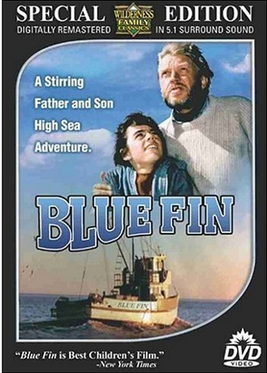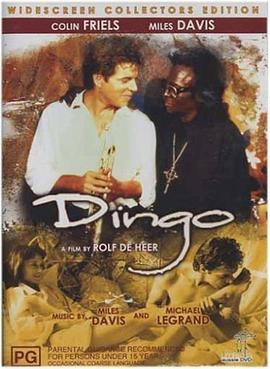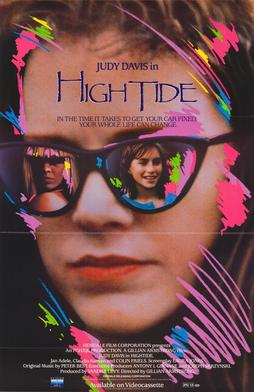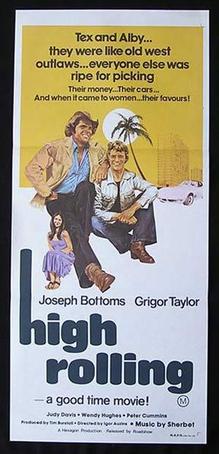Related Research Articles
Timothy Burstall AM was an English Australian film director, writer and producer, best known for hit Australian movie Alvin Purple (1973) and its sequel Alvin Rides Again (1974).

Blue Fin is a 1978 Australian family film directed by Carl Schultz and starring Hardy Krüger, Greg Rowe and Elspeth Ballantyne. It is based on a 1969 Australian novel written by Colin Thiele.

Alvin Purple is a 1973 Australian sex comedy film starring Graeme Blundell in the title role; the screenplay was written by Alan Hopgood and directed by Tim Burstall, through his production company Hexagon Productions and Village Roadshow.

Kangaroo is a 1923 novel by D.H. Lawrence. It is set in Australia.

Colin Friels is a Scottish-born Australian actor of theatre, TV and film and presenter

Dingo is a 1991 Australian film directed by Rolf de Heer and written by Marc Rosenberg. It is notable for marking Miles Davis' first and only speaking role in a narrative feature film.

Hugh Keays-Byrne was a British-Australian actor. Between 1968 and 1972 he was a member of the Royal Shakespeare Company. He played the antagonist in two films from the Mad Max franchise: Toecutter in Mad Max (1979), and Immortan Joe in Mad Max: Fury Road (2015).

Stone is a 1974 Australian outlaw biker film written, directed and produced by Sandy Harbutt. It is a low budget film by company Hedon Productions.
Alvin Rides Again is a 1974 Australian sex-comedy film sequel to Alvin Purple. It was directed by David Bilcock and Robin Copping, who were regular collaborators with Tim Burstall. It was rated M unlike its predecessor which was rated R. Alvin Rides Again still features a lot of full frontal nudity.

High Tide is a 1987 Australian drama film starring Judy Davis, from a script by Laura Jones, about the mother-daughter bond, directed by Gillian Armstrong. Armstrong reported that when she began work on High Tide she pinned a note above her desk: "Blood ties. Water. Running Away." Jan Adele plays Lilli's mother-in-law Bet, in her film debut.

The Last of the Knucklemen is a 1979 Australian film directed by Tim Burstall.
Libido is a 1973 Australian drama film comprising 4 segments written and directed as independent stories, but screened together as one piece, exploring a common theme of instinctive desire and contemporary sexuality.
Petersen is a 1974 Australian drama film directed by Tim Burstall.
Stork is a 1971 Australian comedy film directed by Tim Burstall. Stork is based on the play The Coming of Stork by David Williamson. Bruce Spence and Jacki Weaver make their feature film debuts in Stork, being honoured at the 1972 Australian Film Institute Awards, where they shared the acting prize. Stork won the prize for best narrative feature and Tim Burstall won for best direction. Stork was one of the first ocker comedies. Stork was the first commercial success of the Australian cinema revival called the Australian New Wave.
2000 Weeks is a 1969 Australian drama film directed by Tim Burstall and starring Mark McManus, Jeanie Drynan, and Eileen Chapman.
Eliza Fraser is a 1976 Australian bawdy adventure drama film, directed by Tim Burstall and starring Susannah York, Trevor Howard, Noel Ferrier and John Castle. The screenplay was written by David Williamson.
The Trespassers is a 1976 film directed by John Duigan and starring Judy Morris and Briony Behets.

High Rolling is an Australian buddy comedy directed by Igor Auzins and written by Forest Redlich. Golden Globe Award winners Joseph Bottoms and Judy Davis are among the cast. The soundtrack for the film was provided by the Australian band, Sherbet. The film was released in Australia on 4 August 1977.
End Play is a 1976 Australian thriller film directed by Tim Burstall and starring George Mallaby, John Waters and Ken Goodlet. It was an adaptation of the 1972 novel End Play by Russell Braddon. It was made by Hexagon Productions.
References
- 1 2 Interview with Tim Burstall, 30 March 1998 Archived 15 November 2013 at the Wayback Machine Retrieved 14 October 2012
- 1 2 David Stratton, The Avocado Plantation: Boom and Bust in the Australian Film Industry, Pan MacMillan, 1990 p186-187
- ↑ "Australian Films at the Australian Box Office", Film Victoria Archived 9 February 2014 at the Wayback Machine Retrieved 24 October 2012
- ↑ NEWTON-JOHN TO STAR IN AUSSIE FILM Mann, Roderick. Los Angeles Times 29 October 1981: j5.
- ↑ "Production round-up", Cinema Papers, November 1985 p48
- ↑ "Love, marriage, life and the whole damn thing", Cinema Papers, March 1986 p42
- ↑ "15th Moscow International Film Festival (1987)". MIFF. Archived from the original on 16 January 2013. Retrieved 18 February 2013.
- ↑ "Kangaroo". Umbrella Entertainment. Retrieved 18 April 2010.
- ↑ "Film Victoria - Australian Films at the Australian Box Office" (PDF). Archived from the original (PDF) on 18 February 2011. Retrieved 21 November 2010.